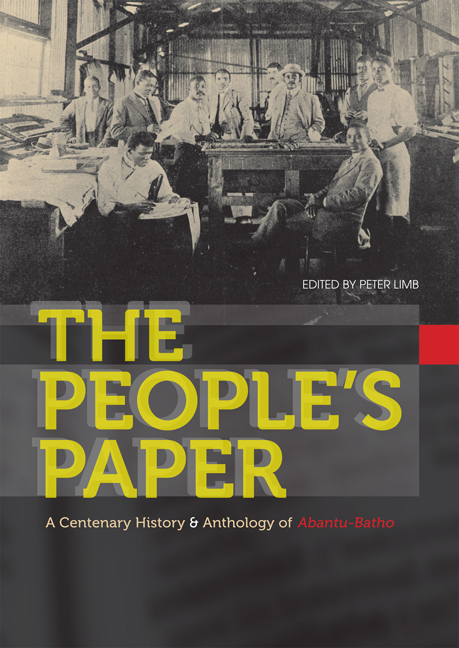Book contents
- Frontmatter
- Contents
- Contributors
- Acknowledgements
- Preface
- List of Abbreviations and Acronyms
- List of Illustrations
- PART I Essays
- Overview
- Introduction: A Centenary History of Abantu-Batho, the People's Paper
- Chapter 1 ‘Only the Bolder Spirits’: Politics, Racism, Solidarity and War in Abantu-Batho
- Chapter 2 ‘They Must Go to the Bantu Batho’: Economics and Education, Religion and Gender, Love and Leisure in the People's Paper
- FOUNDERS AND EDITORS
- THEMES AND CONNECTIONS
- PART II Anthology
Chapter 1 - ‘Only the Bolder Spirits’: Politics, Racism, Solidarity and War in Abantu-Batho
from Overview
Published online by Cambridge University Press: 21 April 2018
- Frontmatter
- Contents
- Contributors
- Acknowledgements
- Preface
- List of Abbreviations and Acronyms
- List of Illustrations
- PART I Essays
- Overview
- Introduction: A Centenary History of Abantu-Batho, the People's Paper
- Chapter 1 ‘Only the Bolder Spirits’: Politics, Racism, Solidarity and War in Abantu-Batho
- Chapter 2 ‘They Must Go to the Bantu Batho’: Economics and Education, Religion and Gender, Love and Leisure in the People's Paper
- FOUNDERS AND EDITORS
- THEMES AND CONNECTIONS
- PART II Anthology
Summary
What were the main news stories for Africans between 1912 and 1931? Some themes stand out: the 1913 Natives’ Land Act; Word War I; the rise of Congress, the Industrial and Commercial Workers’ Union (ICU), and Garveyism; and the opening of Fort Hare. Yet many other issues were also of concern, including the pass laws; labour and gender matters; and local events such as concerts, church meetings and sports. In the previous chapter I sketched the broad contours of Abantu-Batho. In this chapter and the following paired one I examine in more detail how the paper reported and analysed such varied subjects. This chapter focuses squarely on the political sphere, emphasising the context of African political movements, especially Congress, and the state in which Abantu-Batho was obliged to operate, as well as closely related themes of race and racism, the law, political solidarity, and the breakdown of politics – war. I show how the patterns of politics and race in South Africa resonated in the newspaper and influenced its content. The next chapter addresses socio-cultural aspects of gender, class, education, leisure and religion. Together, these two chapters paint a broad canvas of the newspaper and its people, form and content, and set the stage for the other chapters, which explore many of these aspects in finer detail.
POLITICS AND THE PRESS: ‘THE BOLDER SPIRITS’
If politics is the art of the possible, then Abantu-Batho raised entirely new possibilities for Africans by its boldness. In 1920, speaking of rising black discontent, which many Africans did not openly articulate, Davidson D. T. Jabavu noted that ‘[i]t is only the bolder spirits who have ventured to give the world this secret by means of their scathing criticism in their press (the Abantu-Batho of Johannesburg being the most outspoken organ), and through their deputations to Great Britain’. Different editors might from time to time take a more radical or more moderate tack, but the paper's boldness was never in doubt. In 1913 it challenged the very discourse of white domination as expressed by Prime Minister Louis Botha.
- Type
- Chapter
- Information
- The People’s PaperA Centenary History & Anthology of Abantu-Batho, pp. 49 - 80Publisher: Wits University PressPrint publication year: 2012



